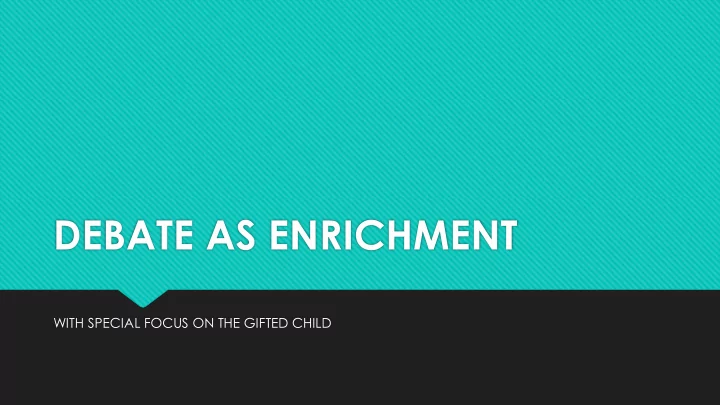

DEBATE AS ENRICHMENT WITH SPECIAL FOCUS ON THE GIFTED CHILD
What is debate A structured argument with opponents* Around an evenly weighted topic In front of unbiased judges A win must be awarded A reason must be given Consider the alternatives to structured argument in the status quo
How it works Two sides One topic released to both sides simultaneously Sides prepare Sides debate while judges listen and mark Debate is awarded with reasons
What matters in debating Relevant Irrelevant Logic Wealth Argument School Knowledge Accent Team work Vocabulary Style Age/ Race/ Gender/ Orientation/ Ability status Strategy Judges’ personal beliefs about topic
Debate formats Policy Parliamentary Karl Popper Lincoln Douglas Oxford World Schools Style
Core competencies in children Active listening Comprehension Language Problem solving* Ability to express oneself* *Vital for young boys as current strategies include disengagement and hostility
Core competencies in teachers Active listening Comprehension Problem solving Analysis
Adaptation in classrooms Most used in English/Home Language classes Used frequently History (essay writing) Used in Science for proofs Case-by-case basis for controversial subjects e.g. climate change carbon reform/fracking/GMOs in geography, land reform/nationalisation/trade unions in economics, creationism/cloning/space exploration in biology and the sciences
Use as an extra-curricula Social / Competitive Intraschool and interschool League and tournament systems A larger competitive structure which children bubble up into* *With various opportunities and benefits
Use in resource constrained environments No kit, field or special equipment Desks, chairs, papers, pens and a clock/watch/stopwatch needed If the upskilling of teachers is prioritised, the activity remains sustainable A fair amount of learning between students Unlike like many other academic or cultural activities, debate generates a lot of its own hype owing to its public nature
Research findings (USA) Are more likely to stay in school Are more likely to participate in class Have better test scores in English & reading Have better test scores than peers in general standardised tests Are more “college ready” Biggest gains from poorest households (because more resourced households provide more opportunities for children to learn)
Gifted children and inclusive education Moving from a medical model of provision to a social justice model of inclusion Gifted children not covered by White Paper / law SA teachers say management asks them to focus on worst off children Gifted children disengage at a rate of disabled children Class sizes further complicate matters
Debate and inclusive education Semi-private schools offer some insight: No formal in-class difference in curricula Enrichment through extra-murals Middle class and especially emerging middle class parents heavily rely on schools for educational cues – teachers favour debate (year-on-year) Debate is an historically elite skill that in SA crosses the class divide Is co-ed Can be held in any language Suitable for any child that can speak/sign regardless of physical differences
Debate as enrichment for gifted learners Learning beyond curricula – often at university level Lack of predictability results in higher levels of engagement Makes gifted children visibly more competitive to parents Becomes a factor when choosing schools Higher percentage of gifted children realising their potential rather than dropping out
Debate and the soft skills gap Sportsmanship Conversational skills The greatest of these being answering questions Sourcing and comparing information
Debate and the confidence gap The confidence gap is real Provides exposure to people from different walks of life Breaks down rigid inter-generational communication blocks Demystifies many things that traditionally wealthier children only have access to: world events, social media, locations like universities Co-educational teamwork Heavily attracts girls (in SA) Children are confident enough to disagree regularly and respectfully with peers
Strides in South Africa Large groundswell and still growing Competitive across all school-types Commitment to quotas Can you afford to be left behind?
How to start Teacher training 2016 Speaker training 2016 Start an annual SAESC tournament Join a league in your region in 2017 OR if no leagues then: Start a league in 2017
Questions? Thank you for your time and attention. Your speaker today was Vashthi Nepaul from Roots Enrichment. More at roots-enrichment.org
Recommend
More recommend